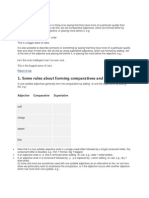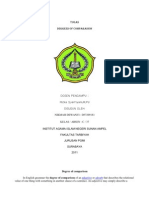The Precedes The Superlative. The Inflected
The Precedes The Superlative. The Inflected
Uploaded by
John SelvaCopyright:
Available Formats
The Precedes The Superlative. The Inflected
The Precedes The Superlative. The Inflected
Uploaded by
John SelvaOriginal Title
Copyright
Available Formats
Share this document
Did you find this document useful?
Is this content inappropriate?
Copyright:
Available Formats
The Precedes The Superlative. The Inflected
The Precedes The Superlative. The Inflected
Uploaded by
John SelvaCopyright:
Available Formats
Adjectives:
A)
Adjectives are words that describe or modify another person or thing or nouns and pronouns in the sentence.
Examples: the tall professor a solid commitment a month's pay a six-year-old child the unhappiest, richest man
B)
Degrees of Adjectives:
The degrees of comparison are known as the positive, the comparative, and the superlative. (Actually, only the comparative and superlative show degrees.) We use the comparative for comparing two things and the superlative for comparing three or more things. Notice that the word than frequently accompanies the comparative and the word the precedes the superlative. The inflected
suffixes -er and -est suffice to form most comparatives and superlatives, although we need -ier and -iest when a two-syllable adjective ends in y (happier and happiest); otherwise we use more and most when an adjective has more than one syllable.
Positiv Comparativ Superlative e e rich lovely richer lovelier richest loveliest most beautiful
beautif more ul beautiful
Certain adjectives have irregular forms in the comparative and superlative degrees:
Irregular Comparative and Superlative Forms good bad little much better worse less more best worst least most
many some far further furthest
The as as construction is used to create a comparison expressing equality:
Examples: He is as foolish as he is large. She is as bright as her mother.
ADVERBS:
You might also like
- Comparative SuperlativeDocument8 pagesComparative SuperlativeDerya DirlenNo ratings yet
- Comparative and Superlative AdjectivesDocument4 pagesComparative and Superlative Adjectivesdaniana sabbiNo ratings yet
- Resultado de Aprendizaje EnglishDocument10 pagesResultado de Aprendizaje EnglishRigoberto Martinez AntonioNo ratings yet
- Comparative and Superlative 4Document15 pagesComparative and Superlative 4JESSICA MELISSA FARROÑAY SULLONNo ratings yet
- 14 GrammarDocument89 pages14 GrammarLiu InnNo ratings yet
- 14grammar PDFDocument90 pages14grammar PDFElmehdi MayouNo ratings yet
- Degrees of AdjectivesDocument3 pagesDegrees of AdjectivesScarlet RedNo ratings yet
- ADJECTIVESDocument52 pagesADJECTIVESNaughty or NiceNo ratings yet
- Grammar Degree of Comparison Rules With Examples - EduDose - NotepadDocument6 pagesGrammar Degree of Comparison Rules With Examples - EduDose - NotepadzawhtayaungNo ratings yet
- Comparatives and SuperlativesDocument11 pagesComparatives and SuperlativesRhonny JaimesNo ratings yet
- 1.1 BackgroundDocument5 pages1.1 BackgroundshaniaNo ratings yet
- Adjective: A Word That Describes A Noun or A PronounDocument13 pagesAdjective: A Word That Describes A Noun or A PronounSarah Golloso RojoNo ratings yet
- Superlative and ComparativeDocument7 pagesSuperlative and Comparativerafa paivaNo ratings yet
- Adjectives Degree of ComparisonDocument4 pagesAdjectives Degree of ComparisonDil Bdr MongerNo ratings yet
- Comparatives and SuperlativesDocument7 pagesComparatives and SuperlativesJacquelin ChangNo ratings yet
- Instructional Material 1Document5 pagesInstructional Material 1fid randebuaNo ratings yet
- Degrees of ComparisonDocument5 pagesDegrees of ComparisonIrmHaSoSweetNo ratings yet
- Comparative Superlative As As ExercisesDocument2 pagesComparative Superlative As As ExercisesEry VivianaNo ratings yet
- Kelompok 6 ComparisonDocument23 pagesKelompok 6 ComparisonFati Andari AlmahdiniNo ratings yet
- A Detailed Lesson Plan in English LanguageDocument8 pagesA Detailed Lesson Plan in English LanguageShalee Balanquit63% (8)
- Comparative and Superlative AdjectiveDocument1 pageComparative and Superlative AdjectiveLiclowreedNo ratings yet
- AdjectivesDocument2 pagesAdjectivesThelma XerriNo ratings yet
- Comparison of Adjectives WK 10Document7 pagesComparison of Adjectives WK 10year6No ratings yet
- Grammar Period 7Document4 pagesGrammar Period 7haroldNo ratings yet
- Using The Degrees of Comparison of AdjectivesDocument17 pagesUsing The Degrees of Comparison of AdjectivesDiane Reign MianaguaNo ratings yet
- Lesson 4a Comparison of Adjectives and AdverbsDocument11 pagesLesson 4a Comparison of Adjectives and AdverbsWane DavisNo ratings yet
- The Comparative and The SuperlativeDocument5 pagesThe Comparative and The SuperlativeGabyMatarNo ratings yet
- Comparatives: We Put Adjectives in The Comparative Form To Compare Two or More ThingsDocument2 pagesComparatives: We Put Adjectives in The Comparative Form To Compare Two or More ThingsJavier Carpintero CanaNo ratings yet
- Adjective & Comparison DegreeDocument13 pagesAdjective & Comparison DegreeDefita ImayuriNo ratings yet
- Materi PPT RW 3 GrammarDocument4 pagesMateri PPT RW 3 GrammarSekar KinasihNo ratings yet
- What Why and How GrammarDocument91 pagesWhat Why and How GrammarXozanNo ratings yet
- Adjectives 140524073135 Phpapp02Document42 pagesAdjectives 140524073135 Phpapp02Donna Rose Malizon ObcianaNo ratings yet
- Comparative AdjectivesDocument9 pagesComparative AdjectivesEffendiyantiNo ratings yet
- Comparative AdjectiveDocument2 pagesComparative AdjectiveArviantiNo ratings yet
- Comparatives and Superlatives Explicación FixedDocument5 pagesComparatives and Superlatives Explicación FixedYahaNo ratings yet
- Degree of ComparisonDocument6 pagesDegree of ComparisonBalya SubarkahNo ratings yet
- Comparative and Superlative Adjectives Spi 0501.1.3Document17 pagesComparative and Superlative Adjectives Spi 0501.1.3Mayara NespoliNo ratings yet
- Lesson 3 AdjectivesDocument14 pagesLesson 3 AdjectivesShaira Nicole PelaezNo ratings yet
- Ingles Unidad 2Document20 pagesIngles Unidad 2Deiissy ChagalaNo ratings yet
- Chapter 10 and 11 - Comparative and Superlative FormDocument10 pagesChapter 10 and 11 - Comparative and Superlative Formmiguelazevedo2020mNo ratings yet
- Fat Difficult Difficult: He of An or That A In, ,, orDocument6 pagesFat Difficult Difficult: He of An or That A In, ,, ormaritorresg2No ratings yet
- Artikel Bahasa Inggris LelyDocument11 pagesArtikel Bahasa Inggris LelyNurmahalina Triani PNo ratings yet
- B.Ing Presentasi Kel. 3Document11 pagesB.Ing Presentasi Kel. 3Dwi Pamungkas100% (1)
- Comparison and ContrastDocument26 pagesComparison and ContrastosydNo ratings yet
- Q4. ENGLISH3Document30 pagesQ4. ENGLISH3Jasmin100% (1)
- Microteaching Presentation Edsl-350Document40 pagesMicroteaching Presentation Edsl-350api-534219069No ratings yet
- Adit Is 40 KG Dennis Is 55 KGDocument11 pagesAdit Is 40 KG Dennis Is 55 KGSandyNo ratings yet
- Rangkuman Bhs InggrisDocument10 pagesRangkuman Bhs Inggrisadityagupta1186No ratings yet
- The Three Degrees of ComparisonDocument8 pagesThe Three Degrees of ComparisonCarlosDeOleoMonteroNo ratings yet
- Adjective by Irfan Bedi CMS HIgh School NarowalDocument6 pagesAdjective by Irfan Bedi CMS HIgh School NarowalIrfan BediNo ratings yet
- Wepik Stepeni Sravneniia Prilagatelnyx V Angliiskom Iazyke Pravila I Primery 20240930045234mpkvDocument8 pagesWepik Stepeni Sravneniia Prilagatelnyx V Angliiskom Iazyke Pravila I Primery 20240930045234mpkvlyazzat.bizness.akkauntNo ratings yet
- Adjectives MeaningDocument27 pagesAdjectives MeaningEnglish With ChamiNo ratings yet
- AdjectiveDocument29 pagesAdjectivesabawoonwazir610No ratings yet
- Draft Handout English IntermediateDocument20 pagesDraft Handout English Intermediateandro prasetioNo ratings yet
- Final Project: Scholarly Essay Topic: Comparison Submitted By: Zainab Nisar and Hussain Ur RehmanDocument9 pagesFinal Project: Scholarly Essay Topic: Comparison Submitted By: Zainab Nisar and Hussain Ur RehmanhammdNo ratings yet
- Adverbs and AdjectivesDocument6 pagesAdverbs and AdjectivesRaphy AlvarezNo ratings yet
- Degrees of ComparisonDocument5 pagesDegrees of Comparisontumpas068No ratings yet
- Comparative and Superlative Form of The Adjective PaolaDocument5 pagesComparative and Superlative Form of The Adjective PaolaMiguel Oscar Melendez TorresNo ratings yet
- A Sentence Diagramming Primer: The Reed & Kellogg System Step-By-StepFrom EverandA Sentence Diagramming Primer: The Reed & Kellogg System Step-By-StepNo ratings yet
- How to Speak Business English with Confidence: Second Edition - Unlocking Advanced Communication Skills for SuccessFrom EverandHow to Speak Business English with Confidence: Second Edition - Unlocking Advanced Communication Skills for SuccessNo ratings yet



























































